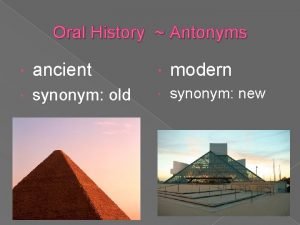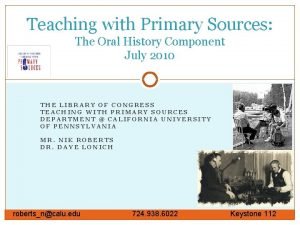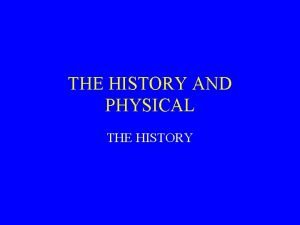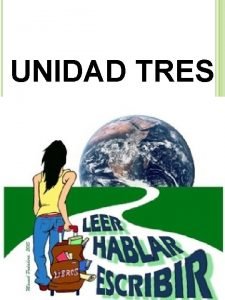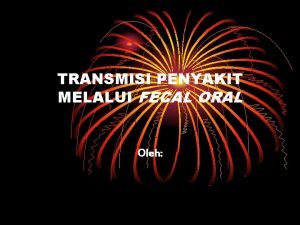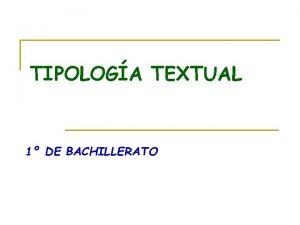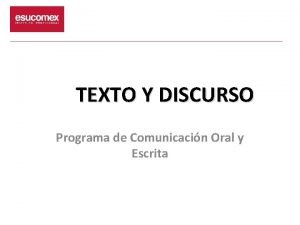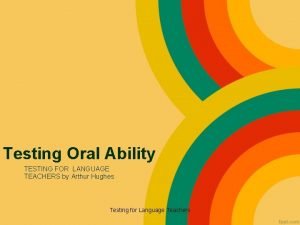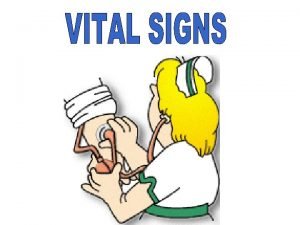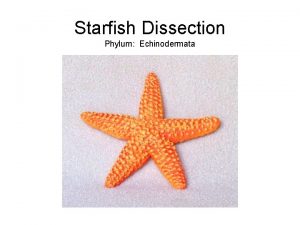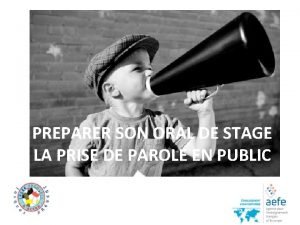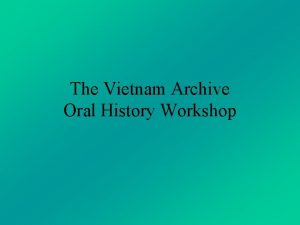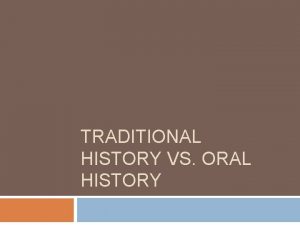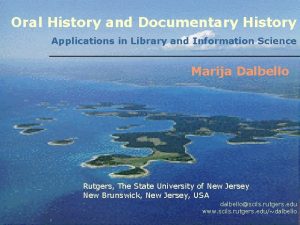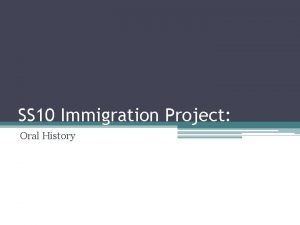WHAT IS ORAL HISTORY WHAT IS ORAL HISTORY
















- Slides: 16

WHAT IS ORAL HISTORY

WHAT IS ORAL HISTORY � Definitions � History of Oral History � Reliability of OH � Tool for the study of Pentecostalism

WHAT IS ORAL HISTORY � “Oral history is the tape recording of reminisces about which the narrator can speak from first hand knowledge”. � Willa U. Brum

WHAT IS OH? � Oral history is the systematic collection of living people's testimony about their own experiences. Oral history is not folklore, gossip, hearsay, or rumor. Oral historians attempt to verify their findings, analyze them, and place them in an accurate historical context. Oral historians are also concerned with storage of their findings for use by later scholars. � Judith Moyer

WHAT IS OH? � Oral history refers both to a method of recording and preserving oral testimony and to the product of that process. It begins with an audio or video recording of a first person account made by an interviewer with an interviewee (also referred to as narrator), both of whom have the conscious intention of creating a permanent record to contribute to an understanding of the past. A verbal document, the oral history, results from this process and is preserved and made available in different forms to other users, researchers, and the public. A critical approach to the oral testimony and interpretations are necessary in the use of oral history. � Oral History Association

OH SEQUENCE Event Narrator Interviewer Historical Record Oral Historian's Anxiety Syndrome

HOW DOES OH DIFFER? � Oral history is distinguished from other forms of interviews by its content and extent. Oral history interviews seek an indepth account of personal experience and reflections, with sufficient time allowed for the narrators to give their story the fullness they desire. The content of oral history interviews is grounded in reflections on the past as opposed to commentary on purely contemporary events.

THE OH IDEAL � Careful attention to copyright and other legal and ethical issues, � A structured, well researched interview format, � A controlled, recorded interview setting, � Collection of first-hand information, � Use of high quality sound or video equipment, � Adherence to careful processing techniques, and � Provisions for making interviews available at an accessible repository.

HISTORY OF OH � OH as a formal methodology developed in the middle of the 20 th Century � "Oral history is as old as history itself. It was the first kind of history" Paul Thompson � "I am not dependent on any one author, but on countless faithful witnesses who either know or remember the facts, apart from what I know myself. ” Bede the Venerable

OH AS ALTERNATIVE METHODOLOGY � "When I say oral tradition, I mean national tradition, which remained generally scattered in the mouths of the people, which everybody said and repeated, peasants, townsfolk, old men, women, even children; which you can hear if you enter one evening into a village tavern; which you may gather if, finding on the road a passer-by at rest, you begin to converse with him about the rain, the season, then the high price of victuals, then the times of the Emperor, then the times of the Revolution. ” Jules Michelet

CONTINUED USE OF ORAL SOURCES � Folklorists � Anthropologists � Sociologists

OH AS SUPPLEMENT TO TEXTS � Allan Nevins: Columbia University � Coined term “Oral History” May 18, 1948 � Student took notes—no recording � “Debrief” great men before their passing for additional historical information � Addition of the portable tape recorder � Oral History Association (1967)

INTELLECTUAL HISTORY � Great men � Founders � Great and presidents documents � Constitutions, � Great wars � National � What peace treaties and global changes is left out?

SOCIAL HISTORY � "By introducing new evidence from the underside, by shifting the focus and opening new areas of inquiry, by challenging some of the assumptions and accepted judgments of historians, by bringing recognition to substantial groups of people who had been ignored, a cumulative process of transformation is set in motion. The scope of historical writing is enlarged and enriched; and at the same time its social messages change. History becomes, to put it simply, more democratic. ” � Paul Thompson

OH AND PENTECOSTALISM � Is Oral History a good methodology for the study of pentecostalisms in Latin America? � Why not? � Opportunities? � Challenges?

PENTECOSTALSIMS IN 21 ST CENTURY � More southern (Latin America, Africa) � More peoples of color than Caucasians � More developing world than majority world � More women than men � More children than adults � More urban than rural � More uneducated than educated
 Oral history synonym
Oral history synonym Oral history component
Oral history component Also history physical
Also history physical Punctate sialectasis meaning
Punctate sialectasis meaning Oral fixation examples
Oral fixation examples Mapa conceptual del achiote
Mapa conceptual del achiote Turkceci.net
Turkceci.net Apa itu fecal oral
Apa itu fecal oral Comunicacion ascendente y descendente y horizontal
Comunicacion ascendente y descendente y horizontal Texto narrativo
Texto narrativo Discurso personal ejemplo
Discurso personal ejemplo Oral ability
Oral ability Why does blood pressure increase with age
Why does blood pressure increase with age Tes lisan
Tes lisan Ambulacral groove starfish
Ambulacral groove starfish Starfish dissection labeled
Starfish dissection labeled Oral de stage troisième
Oral de stage troisième
